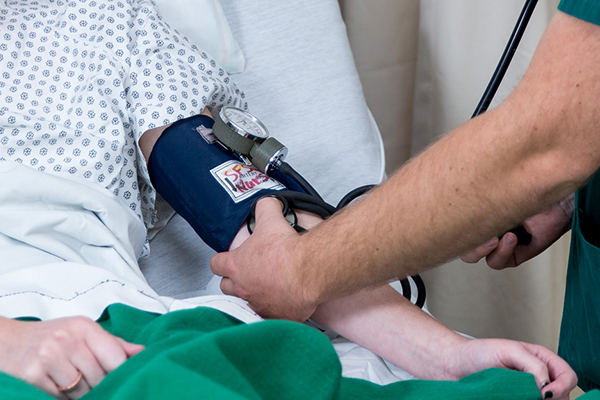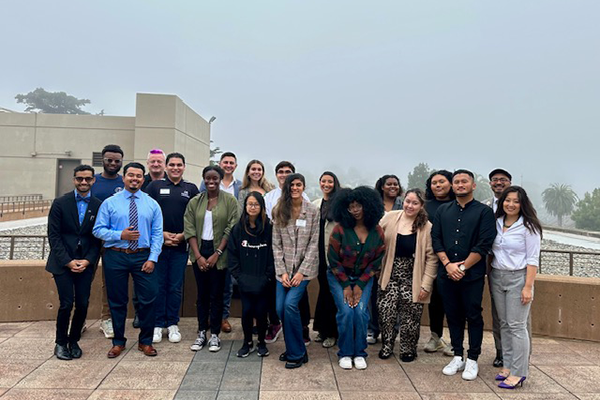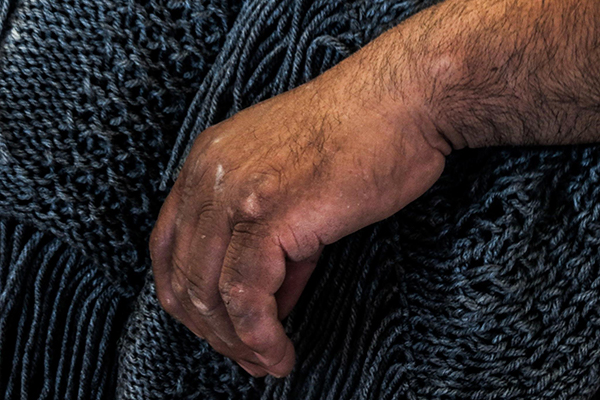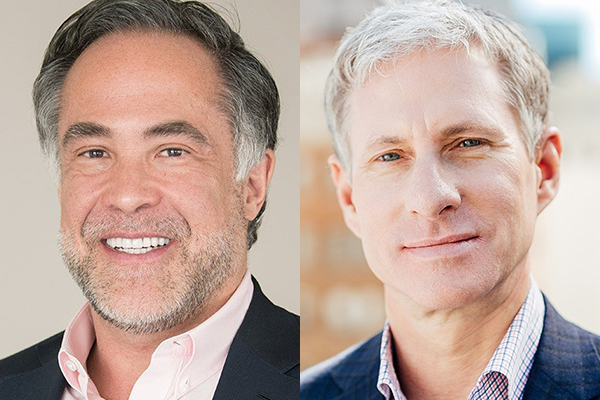News and Announcements

The annual Open Enrollment period ends Friday, Oct. 13, at 5 p.m. (sharp – no late changes accepted). Not making any changes? No need to do anything. If you’re changing your health provider or reenrolling in Health Care Reimbursement Accounts or adding other voluntary benefits, check the Open Enrollment website and/or submit your forums via DocuSign.
For questions, email the Benefits team or visit the 2023 Open Enrollment website. If you’re planning on retiring within the next five years, you can attend the next retirement session with Mary Saw on Wednesday, Oct.18, 1 – 4 p.m. for a full-length presentation on types of retirement, pension formulas, payment options and planning steps. All CalPERS-eligible employees are invited. RSVP to the CalPERS Retirement Session via Qualtrics.
Need information sooner? Email Mary Saw to make a virtual appointment. Visit the Human Resources events page for information and more events.

A group of SF State students with an interest in public service got to hear about the field first-hand from someone who’s practicing it at the highest level on Sept. 29. Curtis Ried, chief of staff and executive secretary for the National Security Council, talked to students in a discussion led by Associate Vice President for Student Life and Dean of Students Miguel Á. Hernández.

Join the Museum Studies Program and the Global Museum for their exhibit opening reception on Saturday, Oct. 14, 1 – 3 p.m. in the Global Museum (Fine Arts 203). Admission is free.
“En los campos del norte / In the Fields of the North” explores the lives of contemporary seasonal and migrant farm workers on the West Coast through community stories, interactives, objects and a series of black-and-white evocative photographs by artist David Bacon. The exhibit is open Tuesday, Oct. 3, – Thursday, Dec. 7, Tuesdays – Thursdays, 11 a.m. – 4 p.m.
Follow the Global Museum and Museum Studies Program on Facebook for updates.
Photo by Angelica Anguiano Alcaraz
As part of the Information Security team’s Cybersecurity Awareness efforts, it will launch an information security channel on Microsoft Teams. The channel aims to give immediate and timely alerts for information security-related issues of importance to the campus community. Alerts are among the best defenses to new threats.
For details, please visit the Information Technology Servies 2023 Cybersecurity Awareness Month page.
We’ve all probably used one password to secure multiple, maybe even all, of our digital accounts. However, doing so is unsafe and only puts personal information at a greater risk of interception over time. If your one password gets stolen because of a breach, your whole cyber life becomes vulnerable. Cybercriminals can use this password to access all your accounts and sensitive information.
The spring 2024 CSU CourseMatch program has released its call for proposals. Campus submissions can be made on the SF State CourseMatch page. The deadline is Tuesday, Oct. 24.
Qualifying courses must be fully online and asynchronous undergraduate general education courses and have less than 15% repeatable grades (D/F/W/NC) from previous semesters (other qualifications are included on the CourseMatch page).
On Saturday, Nov. 4, Zoom will require all users to be on an up-to-date version of the Zoom software.
Update your software by visiting the SFSU Zoom download page and selecting to download the Zoom client for meetings at the top of the page.
For more detailed instructions, please review the instructional guide from Academic Technology.
The SF State Academic Senate will meet Tuesday, Oct. 10, 2 – 5 p.m. virtually via Zoom for its fourth meeting of the academic year. Please contact the Senate office for a Zoom link.
The agenda includes the following:
- Recommendation from the Campus Curriculum Committee: Distance Education Authorization for M.A. in International Relations, in second reading.
- Recommendation from the Campus Curriculum Committee: Certificate in Data Science for Psychology, in first reading.
- The Academic Senate will hear formal presentations from:
- Darlene Yee-Melichar, faculty trustee, CSU Board of Trustees: “CSU Faculty Trustee Report”
- Lori Beth Way, vice provost of Academic Planning and dean of Undergraduate Education: “Board of Trustees Resolution Low Graduating Programs.”
- Desdemona Cardoza, special consultant to the CSU chancellor, and Heidi Riggio, professor of Psychology at CSU Los Angeles: “A Course Equity Portal for the CSU.”
View the full agenda, meeting materials and minutes on the Academic Senate website.
Jimmy Garrett, Ph.D., presents “The SFSU Black Student Union Legacy: In Celebration and Appreciation of Dr. Nathan Hare” on Wednesday, Oct. 11, 2 – 3:30 p.m. in Jack Adams Hall, Cesar Chavez Student Center. The event is part of the SFSU Africana Studies Nathan Hare Speaker Series.
Garrett places the establishment of Black Studies into the historical context of building an insurgent Black student organization on a predominantly white college campus. Founding members of the Black Student Union and prominent freedom fighters will join him in honoring the legacy of Hare, founder and former chair of SF State’s Africana Studies Department.
The speaker series is sponsored by the 1968 – 1969 Black Student Union/Third World Liberation Strike Commemoration Committee of the College of Ethnic Studies. Co-sponsors are the Richard Oakes Multicultural Center, Student Affairs and Enrollment Management, and the George and Judy Marcus Endowed Chair in Social Justice Filmmaking.
For details, please contact Tiffany Caesar, committee chair.
SF State has secured a spot on the Earthquake Shake Simulator tour schedule, presented by the California Governor’s Office of Emergency Services.
To experience a simulated earthquake ranging in magnitude from 3.0 to 7.0, the Earthquake Shake Simulator will be in front of the Student Services Building between 8 a.m. and noon on Thursday, Oct. 12.
Please join Center for Equity and Excellence in Teaching and Learning (CEETL) and Academic Technology as they examine adapting and emerging best practices in teaching and learning with artificial intelligence (AI).
The discussion coves AI for education: How do you use it pedagogically? How about academic integrity? How can faculty use it for their professional development? It will be held Thursday, Oct. 12, 1 – 2.30 p.m. in Library 286 or by Zoom.
These discussion circles are intended to meet faculty where they are in their response to AI technology as it impacts their instruction — whether curious, concerned, already using AI in assignments, prohibiting AI, or those in between and looking for a path forward. They hope to see you in person and online. The facilitator is CEETL Fellow and Professor of English Jennifer Trainor.
Celebrate Hispanic Heritage Month by spending your afternoon with scholars whose work reveals Latinx literature’s expansive reach from the 19th century to the present. Three scholars will present Thursday, Oct. 12, 2 – 3:30 p.m. in Humanities 485 and via Zoom.
Gabriela Valenzuela, assistant professor in CSU Los Angeles’ College of Ethnic Studies, will discuss how 19th-century periodical writings complicate both established timelines of US Central American literary studies and categorizations of literariness.
Crystal R. Perez, assistant professor in CSU East Bay’s English Department, will discuss the study of genre, specifically Chicana historical detective fiction, as a platform for teaching local histories of resistance.
Will Clark, assistant professor in SF State’s English Language and Literature Department, will facilitate the speaker discussion and an audience Q&A.
The panel will reflect on their own scholarly trajectories, pedagogical methods and models aimed at serving the needs of California’s diverse classrooms, and their own experiences navigating the higher education job market.
A light reception will follow. Please register for the Zoom.
Jessica Care Moore will read from her poetry on Friday, Oct. 13, at 6:15pm in Studio One, Marcus Hall.
Moore is the author of “The Words Don’t Fit in My Mouth,” “The Alphabet Verses The Ghetto,” “God is Not an American,” “Sunlight Through Bullet Holes” and “We Want Our Bodies Back.” She is the founder of Black Women Rock! and has recorded with artists such as Common, Nas, Jeezy, Talib Kweli and more.
Reserve free tickets online through the SF State box office.
This event is sponsored by the SF State Foundation and Student Affairs and Enrollment Management.
SF State’s annual Campus Safety Week will be held Monday, Oct. 16, – Friday, Oct. 20, with safety education and training opportunities. A tabling day is scheduled for Wednesday, Oct. 18.
This event is made possible by Environmental, Health and Safety; Enterprise Risk Management; the Office of Emergency Services; and the University Police Department.
Staff are invited to attend the next Staff Forum on Wednesday, Oct. 18 from 10 – 11 a.m. via Zoom. All staff, except Management Personnel Plan (MPP) and faculty, are encouraged to attend. Hosted by Human Resources, this forum will share information from various areas including the College of Professional and Global Education, Raza Faculty & Staff Association, Human Resources and others.
Bring your questions and RSVP via Qualtrics.
The University Budget Committee (UBC) invites the campus community to its next meeting on Thursday, Oct. 19, 10 a.m. – noon via Zoom. Agenda items include a wide range of finance-related topics that affect every part of campus operations.
Members of the UBC are staff, faculty, students and administrators. Visit the Administration & Finance website for more information on the committee.
UBC members offer peer-hosted “office hours” on Fridays after the monthly meetings via Zoom to answer questions about budget-related matters.
Please RSVP at least one week in advance. To RSVP and receive the agenda, e-mail the University Budget Committee.
Student Health Services is bringing back the annual Halloween Open House on Wednesday, Oct. 25, 11 a.m. – 3 p.m.
Students can engage in various stations such as how to manage stress, sexual health topics, mental health and bring together an abundance of campus partners. The event includes free flu shots, snacks, beverages, raffles, giveaways and a haunted hallway!
Learn more on the Student Health Services website or Instagram.

Join the Lam Family College of Business on Tuesday, Oct. 31, noon – 2 p.m., for the Inaugural Lam-Larsen Distinguished Lecture Series event. It features a fireside chat with Martin Chavez, vice chairman of global investment firm Sixth Street, led by Chris Larsen (B.S., '84), co-founder and executive chairman of Ripple Inc. Learn about trends in the investment landscape, Chavez’s personal and educational journey and advice for students.
The event will be held at the Seven Hills Conference Center. A reception with refreshments at Coit Lounge will follow the fireside chat.
Registration is required by Tuesday, Oct. 24 at 5 p.m. Visit the Lam Family College of Business website to learn more and register.
SF State Spotlight
Political Science Professor Ron Hayduk leads a new policy brief that examines San Francisco’s immigrant voting program. The report, “Immigrant Voting and the Movement for Inclusion in San Francisco,” examines the fight to win immigrant voting legislation in San Francisco and how conservatives continue to threaten these rights through coordinated court challenges. Hayduk argues the battle for immigrant voting rights is a microcosm of larger political fights in America — Who belongs in the community?
“Immigrant voting is as American as apple pie and older than our national pastime — baseball. In practice, immigrant voting facilitates civic engagement, immigrant integration and responsive government,” Hayduk said in a Sept. 14 press release from Chinese for Affirmative Action. “At a time when Americans are debating the nation’s identity and the nature of democracy, immigrant voting provides valuable lessons to enhance such debate.”
Immigrant voting has long existed in American history, dispelling the false notion that citizenship is required to vote in the U.S. In fact, immigrants voted in 40 states at some point in time between 1776 and 1926, not just in local elections, but also in state and federal elections.
In 2016, San Francisco voters adopted a ballot measure allowing any parent with a child to vote in local school board elections regardless of their immigration status. Immigrant parents and caregivers have a unique stake in their child’s education including voting for school board members. San Francisco is not alone in permitting immigrant voting in local elections. Today, 17 jurisdictions allow immigrants to vote, some for decades including: 10 towns in Maryland (since the 1990s); three towns in Vermont (2021 and 2023); Oakland (2022); New York City (1969 – 2002, 2021); and Washington, D.C. (2022).
Lawsuits by conservative organizations have been filed in New York City, San Francisco, Oakland and Washington, D.C., in an attempt to prevent immigrant voting from moving forward. The California Court of Appeals issued a ruling in favor of San Francisco, restoring immigrant parents’ right to vote this past summer.
A majority of voters in Oakland enacted a similar law in 2022, and there are efforts to the same in San Jose, Richmond, Santa Ana, Fresno, Pasadena and Los Angeles.
SF State student Marcus Williams is studying abroad this semester at Carlos III, Universidad de Madrid, for his International Business degree. Last week, he took over the SF State Abroad Instagram account.
Check out his story and other students’ stories on the SF State Abroad Instagram page.
Why does San Francisco weather vary so greatly by neighborhood? It’s the geography and topography, School of the Environment Professor and Co-Director Andrew Oliphant tells the San Francisco Chronicle.
Oliphant says he can feel the weather changing during his morning bicycle commute to campus, noting a chill as he rides south on Laguna Honda Boulevard into the West Portal section. “I can feel it getting colder and colder as we drop down into that valley,” he said in the Oct. 4 article.
The Bay Area Rapid Transit (BART) board of directors appointed Public Administration Associate Professor Janey Wang to the BART Measure RR Bond Oversight Committee. She holds the budgeting and financial management seat. Her term is September 2023 – June 2025.
Wang’s duties include:
- oversight of the expenditure of funds from the sale of BART district general obligation bonds;
- assessing how bond proceeds are spent to ensure that all spending is authorized by the ballot measure;
- assessing whether projects funded by bond proceeds are completed in a timely, cost-effective and quality manner consistent with the best interest of BART riders and district residents; and
- publishing an annual report.
Professor of Kinesiology Susan G. Zieff and co-authors recently published an article titled “Reciprocal Coproduction as a Basis for the Diffusion of Global Health Innovations,” in the BMJ Global Health supplement, “Global Health Reciprocal Innovation.” The study focuses on the idea of reciprocal co-construction as a basis for the international sharing of information about innovations that exhibit potential for improving global health.
Drawing on research and their own experiences across a range of health issues, the authors discussed common barriers to reciprocal co-construction and the diffusion of reciprocal innovations. They concluded with lessons drawn from dissemination and implementation science about the effective translation of reciprocal innovations from country to country so that researchers, policymakers and social entrepreneurs can best ensure equity, accelerate adoptions and heighten the likelihood that global health reciprocal innovations will make a positive difference in health.
An Oct. 3 article in the San Francisco Standard highlights Sketchboard, an organization that hosts figure-drawing workshops in the Bay Area. It hires many “non-white, queer, trans, intersex and disabled art models,” the article stated.
Communication Studies Lecturer Angelina Moles has collaborated with Sketchboard.
“What Sketchboard is doing is showcasing the wondrous works of art that all of our bodies are,” Moles said.
Asian American Studies Professor Russell Jeung is cited extensively in a new report from the U.S. Commission on Civil Rights. The report is titled “The Federal Response to Anti-Asian Racism in the United States.” The report marks the second time the commission has examined the rise of anti-Asian racism and discrimination in its 65-year history.
“Ultimately, the absence of adequate performance metrics poses a significant challenge in assessing the federal government’s effectiveness in combating the surge in hate crimes against the Asian community,” said Rochelle Mercedes Garza, chair of the U.S. Commission on Civil Rights, in a Sept. 27 press release. “While these barriers continue to exist, the commission has outlined a holistic strategy to combat anti-Asian hate incidents, ranging from data collection improvements and legal enforcement to community support and education initiatives.”
NASA’s Spaceflight Technology, Application and Research (STAR) program recently accepted Associate Professor of Kinesiology Jimmy Bagley. This annual course for principal investigators and research scientists facilitates entry into space biology research and gives preparation for conducting spaceflight experiments using NASA and commercial platforms.
Bagley also co-authored an article, “Gut check: Unveiling the influence of acute exercise on the gut microbiota,” in Experiential Physiology. His group is among the first to show that just one bout of aerobic exercise can dramatically change gut bacteria composition and function in humans, which may ultimately lead to long-term adaptations and positive health outcomes.
The Quincy Institute for Responsible Statecraft presented a virtual discussion with Andrei Tsygankov, professor of Political Science and International Relations, on Oct. 3. The event is titled “Russia's Foreign Policy: Change and Continuity in National Identity.”